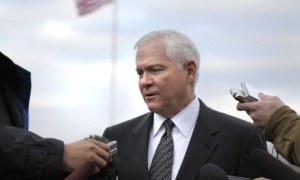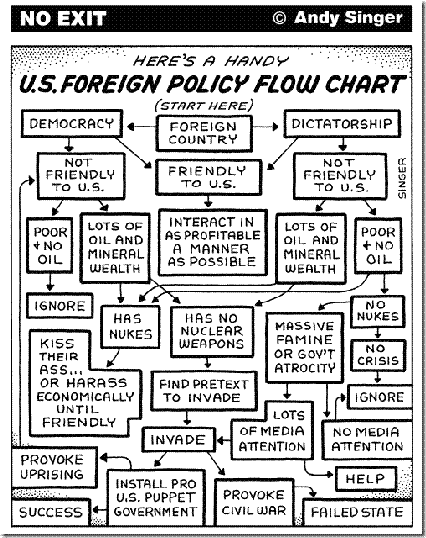‘Endgame’ in Iraq? And what game would that be, exactly?

U.S. Defense Secy. Robert Gates
BBC News reports that U.S. Defense Secretary Robert Gates, slated to keep his post after Obama takes office in January, has told U.S. troops on an airbase in Iraq that their mission is in its ‘endgame’:
Mr Gates said the US military presence would undergo a “significant change of mission” next June when troops are due to withdraw from Iraq’s urban areas.
Under a recently agreed deal between the two countries, US troops will completely withdraw from Iraq by 2011.
However, the US general leading US troops in Iraq has said he expects some soldiers to stay in cities beyond June.
The Iraqi parliament voted in favour of the new security deal with the Americans last month. Iraq’s government has hailed the agreement as the prelude to the return of full sovereignty to the country.
Not that this is the first time we’ve heard such talk, of course. But this time, Pentagon officials may actually be speaking from their icy black hearts.
Commanders on the ground in Iraq expect to restore native control to all 18 Iraqi provinces by June, under the terms of a new security deal with the government of Prime Minister Maliki. U.S. voters will expect incoming president Barack Obama to deliver on his promises of a deliberate but expeditious withdrawal from Iraq.
But it isn’t all campaign politics; the simple truth is that, while automakers badger the U.S. Congress for a handout of a few billion dollars, the staggering financial costs of the occupation of Iraq—in the hundreds of billions per annum—continue to create debt and leave federal and industrial resources ever more tightly stretched. The presence of 150,000 troops in Iraq is edging towards the logistically untenable, and recent developments have created an environment in which withdrawal on Washington’s terms is becoming more opportune.
In October, the Iraqi government officially opened its oil reserves—the third-largest proven reserves in the world—to dozens of foreign investors, under the terms of an ownership contract which was never made public. Crude oil prices have recently plummeted in the wake of decreased demand, but with the hands of international oil companies on the spickets in the petroleum paradise of southern Iraq, OPEC is now largely unable to effectively counter in many markets. Critics of the U.S. administration have long maintained that gaining the ability to exert this kind of pressure on oil markets, from the Middle East to Venezuela, has always been a primary goal of the occupation of Iraq.
 Another important prerequisite for withdrawal which is now a fait accompli is the establishment of a series of ‘megabases’ throughout Iraq, including some of the largest such facilities anywhere on the globe. TomDispatch reports:
Another important prerequisite for withdrawal which is now a fait accompli is the establishment of a series of ‘megabases’ throughout Iraq, including some of the largest such facilities anywhere on the globe. TomDispatch reports:
By now, billions have evidently gone into single massive mega-bases like the U.S. air base at Balad, about 60 miles north of Baghdad. It’s a “16-square-mile fortress,” housing perhaps 40,000 U.S. troops, contractors, special ops types, and Defense Department employees. As the Washington Post’s Tom Ricks, who visited Balad back in 2006, pointed out — in a rare piece on one of our mega-bases — it’s essentially “a small American town smack in the middle of the most hostile part of Iraq.” Back then, air traffic at the base was already being compared to Chicago’s O’Hare International or London’s Heathrow — and keep in mind that Balad has been steadily upgraded ever since to support an “air surge” that, unlike the President’s 2007 “surge” of 30,000 ground troops, has yet to end. . .
. . .Think of this as the greatest American story of these years never told — or more accurately, since there have been a few reports on a couple of these mega-bases — never shown. After all, what an epic of construction this has been, as the Pentagon built a series of fortified American towns, each some 15 to 20 miles around, with many of the amenities of home, including big name fast-food franchises, PXes, and the like, in a hostile land in the midst of war and occupation. In terms of troops, the President may only have put his “surge” strategy into play in January 2007, but his Pentagon has been “surging” on base construction since April 2003.
Aside from providing a bottomless boon to salivating contractors, these airbases ensure that, even with the vast majority of manpower extracted from the region, the U.S. can continue to project its power into the Middle East to protect its diplomatic and economic interests. This sends a strong message to the re-emerging Russian Federation as well as to regional powers such as Iran.
So while it may be true that the official U.S. mission in Iraq is coming to a close, in the sense of realpolitik, the ‘game’ may be just beginning.
Curt’s Christmas Classics, Vol. 1, or ‘A Philosopher’s Manifesto’
 Happy holidays to everyone. I hope each of you who celebrate Christmas for any and all reasons is having a marvelous holiday filled with family, friends, and introspection. Let us all remember that there are a great many people around the planet who will not be having Merry Christmases this year, and that, in most cases, there are decisive reasons why this is so.
Happy holidays to everyone. I hope each of you who celebrate Christmas for any and all reasons is having a marvelous holiday filled with family, friends, and introspection. Let us all remember that there are a great many people around the planet who will not be having Merry Christmases this year, and that, in most cases, there are decisive reasons why this is so.
Introspection. This year, on Christmas afternoon, I decided to re-publish a piece of literature which first appeared in the journal Ethics in 1968. Written by A. Noam Chomsky, it is entitled “Philosophers and Public Philosophy.” There are certain people, to be sure, who will look upon this choice of article as the oblivious pettifoggery of a hopeless hippie liberal–and these are folks who would benefit little, if any, from these extraordinarily wise and still extremely applicable words, so the loss is minimal in any case. But for the discerning patriot and the anarchist thinker alike, Chomsky’s words will still ring largely as true as they did very nearly forty years ago. And so we commence.
PHILOSOPHERS AND PUBLIC PHILOSOPHY
Noam Chomsky
Ethics, Vol. 79 Number 1, October 1968
 For a number of reasons, I have found it extraordinarily difficult to write about this topic. Perhaps it would help set the stage for a discussion if I were to begin by mentioning some of these, even though to do so, I will have to digress somewhat. The first problem is that I am approaching the topic of the symposium from several premises which themselves require argument and justification, although this is not the place to elaborate them. My response to this topic must naturally be based upon a certain interpretation of the context in which questions of public policy arise in the United States at this particular historical moment, an interpretation which obviously cannot fail to be controversial but which, within the framework of this symposium, I cannot develop but can only formulate as a basis for my own discussion of the topic. One premise is that the country faces a serious crisis and that, because of our international role, our crisis is a world crisis as well. Increasingly, the United States has become both the agent of repression and—to use Howard Zinn’s phrase—“the white-gloved financier of counter-revolution” throughout the world. It is, by any objective standard I can imagine, the most aggressive country in the world, the greatest threat to world peace, and without parallel as a source of violence. In part, this violence is quite overt—I need say little about our behavior in Vietnam. In part it is more subtle, the violence of the status quo, the muted endless terror that we have imposed on vast areas that are under our control or susceptible to our influence. Americans are no more likely to accept such a judgment than were citizens of Japan or Germany thirty years ago. However, an objective analysis seems to me to permit no other evaluation. If we consider governments maintained in power by force or overthrown through subversion or intrigue, or the willingness to use the most awesome killing machine in history to enforce our rule, or the means employed—saturation bombing, free-strike zones, napalm and anti-personnel weapons, chemical warfare—there seems to me no other conclusion: we are simply without rival today as an agent of international criminal violence.
For a number of reasons, I have found it extraordinarily difficult to write about this topic. Perhaps it would help set the stage for a discussion if I were to begin by mentioning some of these, even though to do so, I will have to digress somewhat. The first problem is that I am approaching the topic of the symposium from several premises which themselves require argument and justification, although this is not the place to elaborate them. My response to this topic must naturally be based upon a certain interpretation of the context in which questions of public policy arise in the United States at this particular historical moment, an interpretation which obviously cannot fail to be controversial but which, within the framework of this symposium, I cannot develop but can only formulate as a basis for my own discussion of the topic. One premise is that the country faces a serious crisis and that, because of our international role, our crisis is a world crisis as well. Increasingly, the United States has become both the agent of repression and—to use Howard Zinn’s phrase—“the white-gloved financier of counter-revolution” throughout the world. It is, by any objective standard I can imagine, the most aggressive country in the world, the greatest threat to world peace, and without parallel as a source of violence. In part, this violence is quite overt—I need say little about our behavior in Vietnam. In part it is more subtle, the violence of the status quo, the muted endless terror that we have imposed on vast areas that are under our control or susceptible to our influence. Americans are no more likely to accept such a judgment than were citizens of Japan or Germany thirty years ago. However, an objective analysis seems to me to permit no other evaluation. If we consider governments maintained in power by force or overthrown through subversion or intrigue, or the willingness to use the most awesome killing machine in history to enforce our rule, or the means employed—saturation bombing, free-strike zones, napalm and anti-personnel weapons, chemical warfare—there seems to me no other conclusion: we are simply without rival today as an agent of international criminal violence.
There is, furthermore, a serious domestic crisis. Again, I need not speak of the problems of racism and poverty, which are all too obvious. What deserves some comment, however, is the callousness with which we react to the misery we impose. This is perhaps most evident in the growing opposition to the war in Vietnam. It is no secret to anyone that the war is highly unpopular. It is also no secret that the opposition to the war is based primarily on its cost. It is a “pragmatic opposition,” motivated by calculations of cost and utility. Many of those who are now most vociferous in expressing their opposition to the war announce—in fact proclaim—that their opposition would cease if our effort to control and organize Vietnamese society were to prove successful. In that case, in the words of one such spokesman, we would “all be saluting the wisdom and statesmanship of the American government” (Arthur Schlesinger), even though, as he is the first to point out, we are turning Vietnam into “a land of ruin and wreck.” This pragmatic opposition holds that we should “take our stand” where the prospects for success are greater, that Vietnam is a lost cause, and, for this reason, that our efforts there should be modified or abandoned.
I do not want to debate the issue here but only to formulate a second premise from which my discussion of the topic of this meeting will begin: namely, that this quite pervasive pragmatic attitude toward the war in Vietnam is a sign of moral degeneration so severe that talk of using the normal channels of protest and dissent becomes meaningless and that various forms of resistance provide the most significant course of political action open to a concerned citizen.
Nothing supports this judgment more clearly, in my opinion, than the recent change in the domestic political climate, dramatized by the President’s announcement that he will not seek reelection. The political commentators would have it that this event demonstrates that our political system is, after all, healthy and functioning. Confronted with the collapse of its war plans, an international economic crisis, and threatening internal conflicts, the Administration has, in effect, resigned—to put it in parliamentary terms. This shows the health of our democratic system. By such standards, an even more viable democratic system was that of Fascist Japan thirty years ago, where more than a dozen cabinets fell under not-dissimilar circumstances. What would have demonstrated the health of our system would have been a change of policy based on the realization that the policy was wrong, not that it was failing—a realization that success in such a policy would have been a tragedy. Nothing could be more remote from the American political consciousness. It is held, rather, that it is the peculiar genius of the American politics of accommodation to exclude moral considerations. How natural, then, and how good that only pragmatic considerations of cost and utility should determine whether we devastate another country, drive its people from their villages, and carry out experiments with “material and human resources control” that so delight the “pacification theorist.”
 Three times in a generation American technology has laid waste a helpless Asian country. This fact should be seared into the consciousness of every American. A person who is not obsessed with this realization is living in a world of fantasy. But we have not, as a nation, learned to face this central fact of contemporary history. The systematic destruction of a virtually defenseless Japan was carried out with a moral rectitude that was then, and remains today, unchallenged—or nearly so. In fact, Secretary of War Henry Stimson said at the time that there was something wrong with a nation that could listen with such equanimity to the reports of the terror bombing of Japanese cities. There were few voices to echo his doubts—which were expressed before the two atom bombs, before the grand finale requested by General Arnold and approved in Washington, a one thousand plane raid on central Japan launched after the surrender had been announced but before it had been officially received, a raid in which, according to the report of the victims, the bombs were interspersed with leaflets announcing that Japan had surrendered. In Korea, the process was repeated, with only a few qualms. It is the amazing resistance of the Vietnamese that has forced us to ask: What have we done? There is little doubt that, were this resistance to collapse, the domestic furor over the war would disappear along with it.
Three times in a generation American technology has laid waste a helpless Asian country. This fact should be seared into the consciousness of every American. A person who is not obsessed with this realization is living in a world of fantasy. But we have not, as a nation, learned to face this central fact of contemporary history. The systematic destruction of a virtually defenseless Japan was carried out with a moral rectitude that was then, and remains today, unchallenged—or nearly so. In fact, Secretary of War Henry Stimson said at the time that there was something wrong with a nation that could listen with such equanimity to the reports of the terror bombing of Japanese cities. There were few voices to echo his doubts—which were expressed before the two atom bombs, before the grand finale requested by General Arnold and approved in Washington, a one thousand plane raid on central Japan launched after the surrender had been announced but before it had been officially received, a raid in which, according to the report of the victims, the bombs were interspersed with leaflets announcing that Japan had surrendered. In Korea, the process was repeated, with only a few qualms. It is the amazing resistance of the Vietnamese that has forced us to ask: What have we done? There is little doubt that, were this resistance to collapse, the domestic furor over the war would disappear along with it.
Such facts as these—and endless details can all too easily be supplied—raise the question whether what is needed in the United States today is dissent or denazification. The question is a debatable one. Reasonable men may differ. The fact that the question is even debatable is a tragedy. I believe myself that what is needed is a kind of denazification. There is, of course, no more powerful force that can call us to account. The change will have to come from within. The fate of millions of poor and oppressed people throughout the world will be determined by our ability to carry out a profound “cultural revolution” in the United States.
 It might be argued that it is naïve to discuss political and moral consciousness as if they were other than a surface manifestation of social institutions and the power structure and that, no matter what individual Americans may think and feel and believe, the American system will continue to try to dominate the earth by force. The inductive argument for the latter thesis is substantial. The Vietnam War is hardly without precedent in our history. It is, for example, distressingly like our colonial venture in the Philippines seventy years ago. What is more, it is remarkably similar to other episodes in the history of colonialism, for example, the Japanese attempt to defend the independence of Manchukuo from the “Communist threat” posed by Russia and the “Chinese bandits.” Nevertheless, it is difficult to believe that American society will collapse from its own “internal contradictions” if it does not proceed to dominate the world. The belief that “the American system could survive in America only if it became a world system”—to quote President Truman in 1947—has, indeed, guided our international policy for many years, as has the belief, enunciated by liberal and conservative alike, that access to ever expanding markets and opportunities for investment is necessary for the survival of the American Way of Life. There is, no doubt, a large component of myth in ideology. In any event, the question is somewhat academic. Whether we aim for reform or revolution, the early steps must be the same: an attempt to modify political and moral consciousness and to construct alternative institutional forms that reflect and support this development. Personally, I believe that our present crisis is in some measure, moral or intellectual rather than institutional and that reason and resistance can go a certain way, perhaps a long way, toward ameliorating it.
It might be argued that it is naïve to discuss political and moral consciousness as if they were other than a surface manifestation of social institutions and the power structure and that, no matter what individual Americans may think and feel and believe, the American system will continue to try to dominate the earth by force. The inductive argument for the latter thesis is substantial. The Vietnam War is hardly without precedent in our history. It is, for example, distressingly like our colonial venture in the Philippines seventy years ago. What is more, it is remarkably similar to other episodes in the history of colonialism, for example, the Japanese attempt to defend the independence of Manchukuo from the “Communist threat” posed by Russia and the “Chinese bandits.” Nevertheless, it is difficult to believe that American society will collapse from its own “internal contradictions” if it does not proceed to dominate the world. The belief that “the American system could survive in America only if it became a world system”—to quote President Truman in 1947—has, indeed, guided our international policy for many years, as has the belief, enunciated by liberal and conservative alike, that access to ever expanding markets and opportunities for investment is necessary for the survival of the American Way of Life. There is, no doubt, a large component of myth in ideology. In any event, the question is somewhat academic. Whether we aim for reform or revolution, the early steps must be the same: an attempt to modify political and moral consciousness and to construct alternative institutional forms that reflect and support this development. Personally, I believe that our present crisis is in some measure, moral or intellectual rather than institutional and that reason and resistance can go a certain way, perhaps a long way, toward ameliorating it.
 Considerations such as these—which I have not tried to justify but only to formulate—seem to me to provide the framework within which an American should ask himself what is his responsibility as a citizen. About this question there is a great deal to be said, and still more to be done. It is not, however, the question to which this session is addressed, and this is the central fact that causes my difficulty, noted at the outset, in trying to discuss the narrower topic of philosophers and public policy. At a time when we are waging a war of indescribable savagery against Vietnam—in the interests of the Vietnamese, of course, just as the Japanese were merely trying to create an earthly paradise in Manchukuo—at a time when we are preparing for and in part already conducting other “limited wars” at home and abroad, at a time when thousands of young men, many of them our students, are facing jail or political exile because of their conscientious refusal to be agents of criminal violence, at a time when we are once again edging the world toward nuclear war, at such a time it is difficult to restrict oneself to the narrower question: What is one’s responsibility as a philosopher? Nevertheless, I will try to do so.
Considerations such as these—which I have not tried to justify but only to formulate—seem to me to provide the framework within which an American should ask himself what is his responsibility as a citizen. About this question there is a great deal to be said, and still more to be done. It is not, however, the question to which this session is addressed, and this is the central fact that causes my difficulty, noted at the outset, in trying to discuss the narrower topic of philosophers and public policy. At a time when we are waging a war of indescribable savagery against Vietnam—in the interests of the Vietnamese, of course, just as the Japanese were merely trying to create an earthly paradise in Manchukuo—at a time when we are preparing for and in part already conducting other “limited wars” at home and abroad, at a time when thousands of young men, many of them our students, are facing jail or political exile because of their conscientious refusal to be agents of criminal violence, at a time when we are once again edging the world toward nuclear war, at such a time it is difficult to restrict oneself to the narrower question: What is one’s responsibility as a philosopher? Nevertheless, I will try to do so.
 I think it is possible to construct a reasonable argument to the effect that one has no particular responsibility, as a philosopher, to take a stand on questions of public policy, whatever one’s duties may be as a citizen. The argument might proceed as follows. To hold that philosophers have some special responsibility in this regard suggests that they have some unique competence to deal with the problems we face or that others—say biologists or mathematicians—are somehow more free to put these problems aside. But neither conclusion is correct. There is no specific competence that one attains through his professional training as a philosopher to deal with the problems of international or domestic repression, or, in general, with critique and implementation of public policy. Similarly, it is absurd to claim that biologists or mathematicians may freely dismiss these problems on the grounds that others have the technical expertise and moral responsibility to confront them. As a professional, one has only the duty of doing his work with integrity. Integrity, both personal and scholarly, demands that we face the questions that arise internally in some particular domain of study, that are on the border of research, and that promise to move the search for truth and understanding forward. It would be a sacrifice of such integrity to allow external factors to determine the course of research. This would represent a kind of “subversion of scholarship.” The most meaningful contribution that an individual can make toward a more decent society is to base his life’s work on an authentic commitment to important values, such as those that underlie serious scholarly or scientific work, in any field. But this demands that, as a professional, he stick to his last.
I think it is possible to construct a reasonable argument to the effect that one has no particular responsibility, as a philosopher, to take a stand on questions of public policy, whatever one’s duties may be as a citizen. The argument might proceed as follows. To hold that philosophers have some special responsibility in this regard suggests that they have some unique competence to deal with the problems we face or that others—say biologists or mathematicians—are somehow more free to put these problems aside. But neither conclusion is correct. There is no specific competence that one attains through his professional training as a philosopher to deal with the problems of international or domestic repression, or, in general, with critique and implementation of public policy. Similarly, it is absurd to claim that biologists or mathematicians may freely dismiss these problems on the grounds that others have the technical expertise and moral responsibility to confront them. As a professional, one has only the duty of doing his work with integrity. Integrity, both personal and scholarly, demands that we face the questions that arise internally in some particular domain of study, that are on the border of research, and that promise to move the search for truth and understanding forward. It would be a sacrifice of such integrity to allow external factors to determine the course of research. This would represent a kind of “subversion of scholarship.” The most meaningful contribution that an individual can make toward a more decent society is to base his life’s work on an authentic commitment to important values, such as those that underlie serious scholarly or scientific work, in any field. But this demands that, as a professional, he stick to his last.
I think the argument has a good deal of force. I do not doubt that those who pursued their work at the Goethe Institute, in the shadow of Dachau, justified themselves by such considerations as these. Two or three years ago, I would have accepted this line of argument as correct, and it still seems to be persuasive.
There is, of course, an apparent counter-argument: namely, that in a time of crisis one should abandon, or at least restrict, professional concerns and activities that do not adapt themselves in a natural way toward the resolution of this crisis. This argument is actually consistent with the first; and it can, I think, be maintained that this is all there is to the matter.
I think that for many professionals this may well be all that there is to the matter. I do not, for example, see any way to make my work as a linguist relevant, in any serious sense, to the problems of domestic or international society. The only relevance is remote and indirect, through the insight that such work might provide into the nature of human intelligence. But to accept that connection as “relevance” would be hypocrisy. The only solution I can see, in this case, is a schizophrenic existence, which seems to me morally obligatory and not at all impossible, in practice.
Philosophers, however, may be in a somewhat more fortunate position. There is no profession that can claim with greater authenticity that its concern is the intellectual culture of the society or that it possesses the tools for the analysis of ideology and the critique of social knowledge and its use. If it is correct to regard the American and world crisis as in part a cultural one, then philosophical analysis may have a definite contribution to make. Let me consider a few cases in point.

Our society stands in awe of “technical expertise” and gives great prestige and considerable latitude of action to the person who lays claim to it. In fact, it is widely mentioned that we are becoming the first “post-industrial society,” a society in which the dominant figure will be not the entrepreneur but the technical expert or even the scientist, those who create and apply the knowledge that is, for the first time in history, the major motive force for social progress. According to this view, the university and the research institution will be the “creative eye,” the central institutions of this new society, and the academic specialist will be the “new man” whose values will be come dominant and who will himself be at or near the center of power.
There are many who look forward to this prospect with great hope. I am not one of them. It seems to me a prospect that is not appealing and that has many dangers. For one thing, the assumption that the state can be the source of effective social action is highly dubious. Furthermore, what reason is there to believe that those whose claim to power is based on knowledge and technique—or at least the claim to knowledge and technique—will be more humane and just in the exercise of power than those whose claim is based on wealth or aristocratic privilege? On the contrary, one might expect such a person to be arrogant, inflexible, incapable of admitting or adjusting to failure, since failure undermines his claim to power. To take just the most obvious instance, consider the Vietnam War, which was in large measure designed by the new breed of “action intellectuals” and which manifests all of these characteristics.
What is more, it is natural to expect that any group with access to power will construct an ideology that justifies its dominance on grounds of the general welfare. When it is the intelligentsia who aspire to power, the danger is even greater than before, since they can capitalize on the prestige of science and technology while, at the same time, now drawn into the mechanism of control, they lose their role as social critics. Perhaps the most important role of the intellectual since the enlightenment has been that of unmasking ideology, exposing the injustice and repression that exists in every society that we know, and seeking the way to a new and higher form of social life that will extend the possibilities for a free and creative life. We can confidently expect this role to be abandoned as the intellectual becomes the administrator of a new society.
These observations are hardly novel. I am simply paraphrasing a classical anarchist critique, of which typical expressions are the following:
Commenting on Marxian doctrine, Bakunin had this to say:
According to the theory of Mr. Marx, the people must not only destroy [the state] but must strengthen it and place it at the complete disposal of their benefactors, guardians, and teachers—the leaders of the Communist party, namely Mr. Marx and his friends, who will proceed to liberate [mankind] in their own way. They will concentrate the reins of government in a strong hand, because the ignorant people require an exceedingly firm guardianship; they will establish a single state bank, concentrating in its hands all commercial, industrial, agricultural, and even scientific production, and then divide the masses into two armies—under the direct command of the state engineers, who will constitute a new privileged scientific-political estate.
Or compare the more general remarks by the anarchist historian Rudolph Rocker:
Political rights do not originate in parliaments; they are rather forced upon them from without. And even their enactment into law has for a long time been no guarantee of their security. They do not exist because they have been legally set down on a piece of paper, but only when they have become the ingrown habit of a people, and when any attempt to impair them will meet with the violent resistance of the populace. When this is not the case, there is no help in any parliamentary opposition to Platonic appeals to the constitution. One compels respect from others when one knows how to defend one’s dignity as a human being. This is not only true in private life; it has always been the same in political life as well.
History has shown the accuracy of this analysis, both with respect to the role of an intellectual elite and with respect to the nature of political rights, whoever may rule. I see little reason to expect the future to show otherwise.
If it is true that the new, “post-industrial” society will be marked by the access to power of an intellectual elite, basing its claim to power on a presumably “value free” technology of social management, then the importance of the social critic becomes more crucial than ever before. This critic must be capable of analyzing the content of the claimed “expertise,” its empirical justification, and its social use. These are typical questions of philosophy. The same analytical approach that seeks to explore the nature of scientific theories in general or the structure of some particular domain of knowledge or to investigate the concept of a human action can be turned to the study of technology of control and manipulation that goes under the name of “behavioral science” and that serves as the basis for the ideology of the “new mandarins.” Furthermore, this task will be of greater human significance, for the foreseeable future, than the investigation of the foundations of physics or the possibility of reducing mental states to brain states—questions that I do not, incidentally, mean to disparage—I hope that is clear.
 I think it would be important for the university to provide the framework for critical work of this sort. The matter goes well beyond politics in a narrow sense. There are inherent dangers in professionalization that are not sufficiently recognized in university structure. There is a tendency, as a field becomes truly professionalized, for its problems to be determined less by considerations of intrinsic interest and more by the availability of certain tools that have been developed as the subject matures. Philosophy is not free from this tendency, of course. In part, this is of course not only unavoidable but even essential for scientific progress. But it is important to find a way, in teaching even more than in research, to place the work that is feasible and productive at a certain moment against the background of the general concerns that make some questions, but not some others, worth pursuing. It is easy to give examples to show how certain fields have been seriously distorted by a failure to maintain this perspective. For example, I think it is possible to show that certain simple and very useful experimental ideas in the psychology of learning have for many psychologists taken on the status of conditions that define the subject matter of learning theory, much to the detriment of the field, in the long run. I think that in most academic fields a graduate student would benefit greatly from the experience, rarely offered in any academic program, of defending the significance of the field of work in which he is engaged and facing the challenge of a point of view and a critique that does not automatically accept the premises and limitations of scope that are to be found in any discipline. I am putting this too abstractly, but I think the point is clear, and I think that it indicates a defect of much of university education.
I think it would be important for the university to provide the framework for critical work of this sort. The matter goes well beyond politics in a narrow sense. There are inherent dangers in professionalization that are not sufficiently recognized in university structure. There is a tendency, as a field becomes truly professionalized, for its problems to be determined less by considerations of intrinsic interest and more by the availability of certain tools that have been developed as the subject matures. Philosophy is not free from this tendency, of course. In part, this is of course not only unavoidable but even essential for scientific progress. But it is important to find a way, in teaching even more than in research, to place the work that is feasible and productive at a certain moment against the background of the general concerns that make some questions, but not some others, worth pursuing. It is easy to give examples to show how certain fields have been seriously distorted by a failure to maintain this perspective. For example, I think it is possible to show that certain simple and very useful experimental ideas in the psychology of learning have for many psychologists taken on the status of conditions that define the subject matter of learning theory, much to the detriment of the field, in the long run. I think that in most academic fields a graduate student would benefit greatly from the experience, rarely offered in any academic program, of defending the significance of the field of work in which he is engaged and facing the challenge of a point of view and a critique that does not automatically accept the premises and limitations of scope that are to be found in any discipline. I am putting this too abstractly, but I think the point is clear, and I think that it indicates a defect of much of university education.
In the specific case of social and behavioral science in a “post-industrial society” with the university as a central institution of innovation and authority, the defect may become a disaster. To put it succinctly, the university requires a conscience, free from the controls that are implicit in any association with the organs of power, from any role in the formation and implementation of public policy. I think that any serious university should be thinking about how it might institute a program of radical social inquiry that would examine the premises of public policy and attempt a critical analysis of the prevailing ideology. Ideally, such a program should, perhaps, not even have a separate faculty associated with it but should, rather, seek to involve as wide a segment of the university community as possible in far-reaching social criticism. A program of this sort would be a natural and valuable outgrowth of the philosopher’s concern for conceptual analysis.
 Again, I would like to stress that the issue is not one of politics in a narrow sense. I think that the applications of behavioral science in education or therapy, to mention just two examples, are as much in need of critical analysis as the applications to counterinsurgency. And the assumptions and values that lie behind the poverty program or urban renewal deserve the same serious analysis as those that lie behind the manipulative diplomacy of the postwar era. A dozen other examples could easily be cited. In the kind of liberal technocracy that we are likely to evolve, repression may be somewhat more masked and the technique of control, more “sophisticated.” A new coercive ideology, professing both humane values and “the scientific ethic,” might easily become the intellectual property of the technical intelligentsia, which is based in the university but moves fairly freely to government and foundations. The fragmentation and professionalization which accompanies the decline of the “free-floating intellectual” who, we are told, is a relic from an earlier stage of society, can itself contribute to new forms of social control and intellectual impoverishment. This is not a necessary development, but it is also not an unlikely one. And it is one that we must find a way to resist, as much as we must find ways to resist other less subtle forms of barbarism. It would be entirely within the tradition of philosophy if it were to regard this task as its own.
Again, I would like to stress that the issue is not one of politics in a narrow sense. I think that the applications of behavioral science in education or therapy, to mention just two examples, are as much in need of critical analysis as the applications to counterinsurgency. And the assumptions and values that lie behind the poverty program or urban renewal deserve the same serious analysis as those that lie behind the manipulative diplomacy of the postwar era. A dozen other examples could easily be cited. In the kind of liberal technocracy that we are likely to evolve, repression may be somewhat more masked and the technique of control, more “sophisticated.” A new coercive ideology, professing both humane values and “the scientific ethic,” might easily become the intellectual property of the technical intelligentsia, which is based in the university but moves fairly freely to government and foundations. The fragmentation and professionalization which accompanies the decline of the “free-floating intellectual” who, we are told, is a relic from an earlier stage of society, can itself contribute to new forms of social control and intellectual impoverishment. This is not a necessary development, but it is also not an unlikely one. And it is one that we must find a way to resist, as much as we must find ways to resist other less subtle forms of barbarism. It would be entirely within the tradition of philosophy if it were to regard this task as its own.
More specific problems might be mentioned. Let me bring up just one. We all know that thousands of young men may be found guilty of “civil disobedience” for following the dictates of their conscience in the next few months and may suffer severe penalties for their willingness to live by the values that many of us profess. It would be a serious error to regard this as a merely a matter of the enforcement of law. The substantive content of law is determined, to a significant extent, by the level of intellectual culture and moral perception of the society in general. If philosophers feel that these matters are part of their concern, then they must contribute to shaping the principles and understanding that determine what the interpretation of law will be in concrete instances. To mention simply the most obvious question: Why is it not “civil disobedience” for the President to violate domestic and international law by the use of force in Vietnam, while it is civil disobedience for young men to serve as agents of criminal acts? The answer to this question has little to do with the law, and much to do with the distribution of force in our society. The courts are not capable of deciding that it is illegal to send an American expeditionary force to crush a rebellion in some foreign land, because of the social consequences that would ensue from that decision. When a powerful executive carries out criminal acts with impunity, the concept of “government of laws” erodes beyond recognition, and the entire framework of law disintegrates. Those who would like to believe that their commitment is to truth, not power, cannot remain silent in the face of this travesty. It is too late to create a climate of opinion that will enable the judiciary to function, thus saving men from imprisonment for conscientious resistance to a demand that they be war criminals. It is not too late to work for a reconstruction of values and for the creation of a more healthy intellectual community to which these men can return as welcome and honored members. Surely the university faces no more urgent task, in the coming years, than to regenerate itself as a community worthy of men who make this sacrifice out of a commitment to the moral and intellectual values that the university pretends to honor. And I think it requires no elaborate argument to show that the faculty of philosophy might well be at the forefront of this effort.

The temptation is overwhelming, in a discussion of this issue, to quote Marx’s famous marginal comment of Feuerbach, that “philosophers have only interpreted the world differently; the point, however, is to change it.” I will not try to resist the temptation; the task that faces the responsible citizen is to work to change the world. But we should not overlook the fact that interpretation and analysis provided by the philosopher, by the intellectual more generally, are essential ingredients in any serious attempt to change the world. If student radicalism often turns to an anti-intellectual direction, the fault in part lies in the deficiencies of scholarship, of our intellectual culture, of the disciplines—such as philosophy—and the institutions—such as the university—that exist only to interpret and advance and defend this culture. Senator Fulbright, in a recent and extremely important speech on the Senate floor, stated that the universities have betrayed a public trust by associating themselves with the government and the corporate system in the military-industrial-academic complex. They have, as he rightly said, largely abandoned the function that they should serve in a free society and have forfeited their right to public support, to a substantial degree, by this retreat—one might say, by this treachery. Only a hypocrite can preach the virtues of non-violence to the Vietnamese or the black community in the United States, while continuing to tolerate the incomparably greater violence to which they are subjected by the society to which he belongs. Similarly, only a hypocrite can condemn the anti-intellectualism of student activists, while tolerating the subversion of scholarship, the impoverishment of intellect, let us be honest—the downright immorality of the academic professions as they support American violence and repression by contributing to weaponry and counterinsurgency, by permitting the social sciences to develop as a technology of control and manipulation, or, more subtly, by helping to create and uphold the system of values that permits us to applaud the pragmatic and responsible attitude shown by those who now oppose the war in Vietnam on grounds of tactics and cost effectiveness. To restore the integrity of intellectual life and cultural values is the most urgent, most crucial task that faces the universities and the professions. Philosophers might take the lead in this effort. If they do not, then they too will have betrayed a responsibility which should be theirs.
– Massachusetts Institute of Technology
Democrats: US Occupations in Middle East Are Costing Double the Official Figures
…and we’re merely talking dollars here, to say nothing of the military and civilian lives, national sovereignties, diplomatic standards, and international reputes which are being devoured by the New Colonialism.
In what White House spokes-Barbie Dana Perino has laughably referred to as an “attempt to muddy the waters,” a report drafted by Democratic members of Congress’ Joint Economic Committee (JEC) outlines how, in economic terms, American military operations in Iraq and Afghanistan are costing as much as double the officially reported figures—up to $1.3 trillion in direct costs, and at least that much more in tangential or derivative costs to the economy.
 Only a few weeks ago, you may recall, Perino educated the White House press corps on the unexpected health benefits of global warming:
Only a few weeks ago, you may recall, Perino educated the White House press corps on the unexpected health benefits of global warming:
“This is an issue where I’m sure lots of people would love to ridicule me when I say this, but it is true that many people die from cold-related deaths every winter. And there are studies that say that climate change in certain areas of the world would help those individuals.”
No, Ms. Perino, I don’t enjoy ridiculing you. I’m just—at least for the moment—profoundly embarrassed that you are the principal public voice of the Chief Executive of the United States of America. And that means I don’t relish paying your salary.
On the new war report, which states that, between 2002 and 2008, the Iraq and Afghanistan campaigns will have cost over $20,000 for a U.S. family of four, the BBC writes:
The White House has called the report politically motivated.
“This report was put out by Democrats on Capitol Hill,” White House press secretary Dana Perino was quoted by the Associated Press as saying. “This committee is known for being partisan and political.”
“They did not consult or co-operate with the Republicans on the committee, and so I think it is an attempt to muddy the waters on what has been some positive developments being reported out of Iraq.”
And some of the figures the report contains were labeled speculative by funding experts, the Washington Post newspaper reported.
‘Lost earnings’
The report was written by Democratic members of Congress’s Joint Economic Committee (JEC).
The cost of the war… is becoming the first thing the people mention after the loss of life when they are opposed to this war
Chuck Schumer
JEC chairmanThe BBC’s Justin Webb in Washington says it was designed to shock Americans into stronger opposition to the war in Iraq.
The Democrats calculate that between 2002 and 2008 the campaigns in Iraq and Afghanistan will have cost the average US family of four about $20,900.
The report adds that the amount could rise to $46,400 over the next decade.
It cites costs such as interest payments on money borrowed from abroad to pay for the wars, lost investment in US businesses, and the cost of oil market disruptions.
Oil prices have surged since the start of the war in Iraq, from about $37 a barrel to more than $90 a barrel in recent weeks. The report says the rise has hit US consumers.
Anti-war Protests Abound in the U.S.
According to the BBC, tens of thousands of U.S. citizens participated in anti-war activities today, organized in major cities around the nation in response to a call from the United for Peace and Justice coalition:
Rallies took place in a dozen cities, with the biggest crowds gathering in New York, Chicago and San Francisco.
They were timed to coincide with the fifth anniversary of a vote by the US Senate to authorise the Iraq invasion.
Those taking part, who included relatives of servicemen fighting in Iraq, urged the US congress to cut off funding for the war…
…One of the national co-ordinators of the protests, Leslie Kielsen, told Reuters that the “half a trillion” dollars spent on the war was money that could have been used for education, social housing and to feed the hungry.
In New York participants gathered in Union Square, before marching on to Foley Square, which is close to many of the city’s largest courthouses and government offices.
A two minute silence was held to honour those killed in the violence which has blighted Iraq since the 2003 US-led invasion.
An estimated 10,000 people joined a march in Chicago and in San Francisco there was an even greater turnout.
Déjà vu in the Persian Gulf
The United States is a large and diverse country, and it is as difficult to make reasonable generalities about its people as about its landscapes. There are some awe-inspiring places and spaces to experience, and I believe that people here are, for the most part, what are called good folks—just as, anywhere one goes in the world, there are mostly good folks to be found.
If you’ve never been to America, you should check it out. There are way too many superhighways and supermarkets and superfactories, of course. But I can tell you from experience that having breakfast in New Orleans’ French Quarter and camping on the Oregon seashore are both great things to do, and there are probably plenty of unique, interesting places where you live, too.
Most Americans are as friendly as can be. It’s not Mayberry in springtime everywhere all the time, by any means, but you get what I mean.
There are some Americans, though—a relatively small but increasing number of them—who believe that America is just about the only place on Earth where one can find good things and good folks. They have taken nationalism too far. They mistake warmongering for defensive posturing, confuse marketing desk rhetoric with traditional values, and apparently don’t understand the difference between the worship of symbols and patriotism, between propaganda and news. Perhaps worst of all, they equate freedom with material prosperity and quality of life with creature comfort.
September 11, 2001 was both an ineffably immense tragedy and a green light for these guys to get serious. After September 11, you could ask any question you pleased except for: Why? Why did this happen? Why would anyone want to do this to us? You didn’t have to ask that question, because it had already been answered: You’re American, and they hate your freedoms because they’re violent savages, just like them injuns was.
This crowd is in power now, and they’re enlightening the less privileged as we speak.
 To them, those inside the U.S. that disagree with their pomp and bigotry are mentally infirm, treasonous deviants, and outside dissenters are both deviant (since they’re not purebred neo-cons) and subhuman (since they’re not American). They are right about everything not because they are educated and experienced but because they are American—because, by the power of Grey Skull, they are anointed by divinity, in some conceptions. They’re your go-to guys: for the only credible answers to everything from religion, to history, to the diplomatic and economic affairs of other countries, to science and the environment, to whether or not people should be taken off life support regardless of their own wishes, just ask the ultra-nationalist neo-conservative leadership of the United States of America. They’ll take it in stride, no worries.
To them, those inside the U.S. that disagree with their pomp and bigotry are mentally infirm, treasonous deviants, and outside dissenters are both deviant (since they’re not purebred neo-cons) and subhuman (since they’re not American). They are right about everything not because they are educated and experienced but because they are American—because, by the power of Grey Skull, they are anointed by divinity, in some conceptions. They’re your go-to guys: for the only credible answers to everything from religion, to history, to the diplomatic and economic affairs of other countries, to science and the environment, to whether or not people should be taken off life support regardless of their own wishes, just ask the ultra-nationalist neo-conservative leadership of the United States of America. They’ll take it in stride, no worries.
Let us go, you and I, back in time to February of 2003. Frontline, a program on public broadcast television, aired a piece called “The War Behind Closed Doors.” This was touted as a balls-to-the-wall, nitty-gritty exposé of the “grand strategy” behind Bush’s new foreign policy as America stood at the “brink of war” with Iraq:
As the U.S. stands at the brink of war with Iraq, many are now warning about the potential consequences: the danger of getting bogged down in Baghdad, the prospect of longtime allies leaving America’s side, the possibility of chaos in the Middle East, the threat of renewed terrorism.
But the Bush administration insiders who helped define the “Bush Doctrine,” and who have argued most forcefully for war, are determined to set a course that will remake America’s role in the world. Having served three Republican presidents over the course of two decades, this group of close advisers — among them Vice President Dick Cheney, Secretary of Defense Donald Rumsfeld, and perhaps most importantly, Deputy Secretary of Defense Paul Wolfowitz — believe that the removal of Saddam Hussein is the necessary first act of a new era.
In “The War Behind Closed Doors,” FRONTLINE traces the inside story of how those advisers — calling themselves “neo-Reaganites,” “neo-conservatives,” or simply “hawks” — set out to achieve the most dramatic change in American foreign policy in half a century: a grand strategy, formally articulated in the National Security Strategy released last September, that is based on preemption rather than containment and calls for the bold assertion of American power and influence around the world.
Through interviews with key Republican insiders, foreign policy analysts, and longtime White House observers, the report reveals how America got to the brink of war with Iraq — and how a war and its aftermath will put these advisers’ big idea to the test.
“The War Behind Closed Doors” follows a long-running policy battle between two of Washington’s most powerful insiders and the philosophies they represent: Secretary of State Colin Powell and Deputy Secretary of Defense Paul Wolfowitz. Powell, who held the top military job at the Pentagon under President George H.W. Bush and other powerful posts at the highest levels of government, is a cautious realist who represents the establishment’s abiding belief in diplomacy and the containment of foreign enemies. Wolfowitz, who built a career as a smart and tough hardliner at the Departments of State and Defense, champions the idea of preemption, striking first to defend America and to project its democratic values.
At the time the Gulf War ended in 1991, Powell was the chairman of the Joint Chiefs of Staff and Wolfowitz was deputy secretary of defense for policy, the third-highest ranking civilian in then-Secretary of Defense Dick Cheney’s Pentagon. Powell was instrumental in stopping the war short of going to Baghdad and removing Saddam Hussein. Wolfowitz and other hardliners were less than enthusiastic about that decision.
“Paul Wolfowitz believed then that it was a mistake to end the war,” says Richard Perle, chairman of the influential Defense Policy Board and a veteran of the Reagan administration. “They underestimated the way in which Saddam was able to cling to power, and the means he would use to remain in power. That was the mistake.”
Soon after the Gulf War, Wolfowitz supervised the drafting of a set of classified policy guidelines, called a Defense Planning Guidance, for how the U.S. should deal with Saddam Hussein and the rest of the world in the post-Cold War era. Wolfowitz believed containment was an old idea — a relic of the Cold War — and that America should use its overwhelming military might preemptively, and unilaterally, if need be. His draft of these policy guidelines was leaked to the press in 1992.
“Inside the U.S. defense planning establishment, there were people who thought this thing was nuts,” Barton Gellman of The Washington Post tells FRONTLINE. “The first draft said that the United States would be prepared to preempt the use of nuclear, biological, or chemical weapons by any other nation, even, the document said, ‘Where our interests are otherwise not engaged.’ … It spoke of punishing or retaliating for that use, but it also said ‘preempt.’ This was the first time.”
“Wolfowitz basically authored a doctrine of American hegemony,” says historian and foreign policy expert John Lewis Gaddis, “a doctrine in which the United States would seek to maintain the position that it came out of the Cold War with, at which there were no obvious or plausible challengers to the United States. That was considered quite shocking in 1992. So shocking, in fact, that the Bush administration, at that time, disavowed it.”
As the first President Bush left office, Wolfowitz’s draft plan went into the bottom drawer, but it would not be forgotten.
“The War Behind Closed Doors” goes on to recount how the Clinton administration struggled to deal with Saddam Hussein’s defiance of U.S. and U.N. containment policies, while hawks in the neoconservative wing of the Republican Party grew increasingly impatient.
With the election of George W. Bush in 2000, however, the hawks saw a new opportunity to implement a stronger, forward-leaning American stance in the world. Yet during the new president’s first year in office, skirmishing between Colin Powell’s State Department and Rumsfeld’s Pentagon — where Wolfowitz is now the second-ranking civilian — left the adminstration’s foreign policy stalled in a kind of internal gridlock.
All that would change on Sept. 11, 2001.
Four days after the attacks on New York and the Pentagon, President Bush and his Cabinet held a war council at Camp David. “From the first moments after Sept. 11, there was a group of people, both inside the administration and out, who believed that the war on terrorism should target Iraq — in fact, should target Iraq first,” says Kenneth Pollack, author of The Threatening Storm: The Case for Invading Iraq (2002) and a former member of the National Security Council staff in the Clinton administration.
But Colin Powell and Gen. Henry Shelton, chairman of the Joint Chiefs, were determined to rein in the hawks. Powell’s argument — that an international coalition could only be assembled for a war against Al Qaeda and the Taliban in Afghanistan, not an invasion of Iraq — won the day, and Iraq was put on the back burner.
Yet President Bush had made it clear that the U.S. would not stop at pursuing terrorists and bringing them to justice. “We will make no distinction between the terrorists who committed these acts and those who harbor them,” the president told the nation on the evening of Sept. 11.
Four months later, with the Taliban defeated and Al Qaeda largely dispersed, Bush was ready to move on to the next phase of the war on terrorism. In his State of the Union address, he laid the groundwork for an invasion of Iraq, tying Saddam Hussein’s regime to terrorism and weapons of mass destruction.
“States like these,” Bush declared, “and their terrorist allies constitute an axis of evil arming to threaten the peace of the world. … The United States of America will not permit the world’s most dangerous regimes to threaten us with the world’s most destructive weapons.”
The stage was set. Phase two was underway, and preemption would get its test case. The president had set a course for the U.S. to use its military power not only to topple Saddam Hussein but to promote democracy in Iraq and the rest of the Middle East. Wolfowitz and the hawks, by all appearances, had succeeded.
“I wrote a piece in the Post two days after the State of the Union,” recalls William Kristol, editor of the influential neoconservative magazine The Weekly Standard, “saying we’ve just been present at a very unusual moment: the creation of a new American foreign policy.”
In the thirteen months since that speech, the Bush administration has moved steadily toward war with Iraq, though Colin Powell was able to convince the president to seek U.N. backing. Whether that approval is won or not, it is clear that this administration intends to alter America’s strategic relationship to the world.
So, let’s take inventory: It was all Colin Powell’s fault for being such a sissy, Paul Wolfowitz was tough and smart, and Saddam Hussein was directly responsible for 9/11 in a Dr. Claw kind of way. No more pushin’ us around with your WMDs and your secret terrorist supersquads, neither of which—if you really had them at all, which we somehow need not conclusively prove—you could possibly have come to possess without our express approval and assistance in the first place—but, hey! That was years ago. It’s the start of a Brand. New. Era. You can just imagine the specter of George Washington smiling down upon its moment of creation, just as he is about to be joined by Jesus Christ, perhaps.
I am sorry that some Americans, academic luminaries, ersatz pundits, and disinterested suburbanites among them, saw the need to make complete asses of themselves and their countrymen and countrywomen during the president of Iran’s recent visit to New York City. Curiously, I get the feeling that most of the worst offenders had, only the day before Ahmadinejad’s speeches (it having been a Sunday, you see), believed in kissing cheeks, loving enemies, universal brotherhood, and altruism to the point of self-immolation if necessary. “Half-truths, canards and lies,” as one friend described the scene, somehow abounded on Monday.
America’s massive occupation of Iraq is being resisted with weapons that may—may—have trickled in from Iran, and Tehran is to blame, even though, when American-built planes drop American-made bombs to churn up the farms, cities, arms, and legs of the Lebanese, Washington whistles absently across the Atlantic. Palestinians resist their colonial overlords with whatever desperate means are available, and Tehran is to blame. Iran wishes to exercise its right to peaceful nuclear energy without having to obtain the permission of the only nation ever to detonate atomic weapons in heavily populated civilian areas, and so Tehran is certainly on the path to a nuclear war against the world. The president of Iran quips outrageously provocative one-liners which are widely mistranslated, and that is inexcusable; the president of the United States sweeps whole nations into an ‘axis of evil’ and warns the international community to back off, and is lauded as a visionary.
Gargantuan military bases are being erected throughout Iraq and on the border with Iran. A great deal of the oil from the Gulf must pass through the Straits of Hormuz. A successful defiance of unilateral imperialism anywhere near Iraq cannot be tolerated by the neo-conservative elite management caste. Just one war could hardly constitute a whole new radiant era of murderous magnanimity, anyway.
We know what to expect, all the same hoping fervently that we must be wrong to expect it. We know who to thank for the policies and propaganda. But we live in a land where free speech is ubiquitous, and enough outcry is to injustice what water was to the Wicked Witch. This time, can there be any excuse for the inaction of concerned citizens?













1 comment